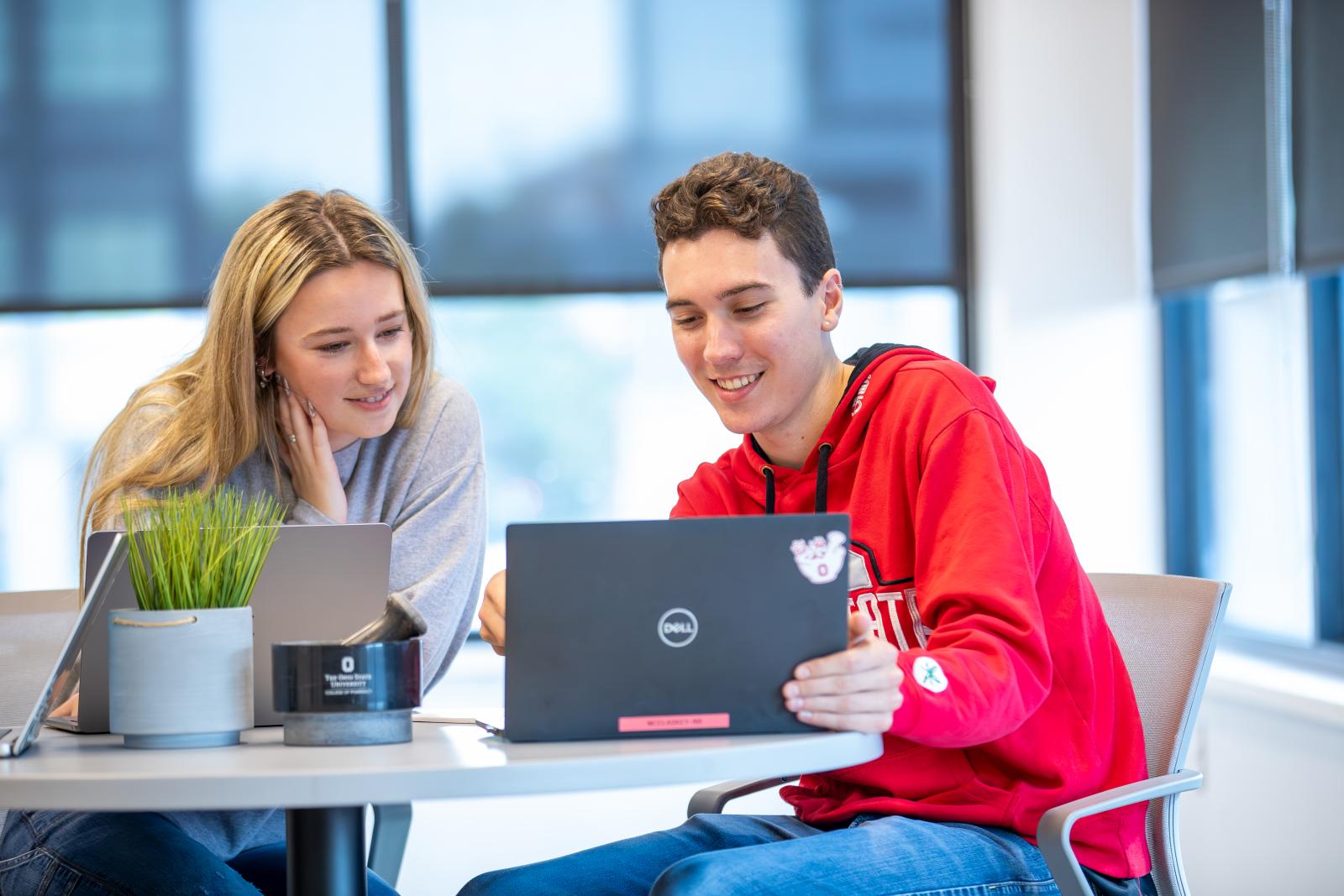Online pedagogy: Downing decodes meaningful learning experiences in online setting

When we picture academic success, high marks and cumulative GPAs are often the first metrics that come to mind. But do these paint the full picture of a student’s progress?
Typically, instructors look for evidence that their students not only understand course content but are also able to apply it to complex situations in their own lives. Each semester, instructors aim to capture lightning in a bottle, leading their class to a “significant learning experience.”
Molly Downing, PhD, assistant professor of practice at The Ohio State University College of Pharmacy, has been searching for the right formula to make these experiences a regular occurrence in her classroom. Since 2015, Dr. Downing has been instructing students at Ohio State in an online asynchronous format.
“Teaching online can make it much harder to meaningfully engage students with the course material,” Dr. Downing explained. “When I first started teaching online, the format was largely focused on covering foundational knowledge through videos and quizzes. I had to carefully think about what strategies and teaching models could elevate online content and create an active learning experience for my students.”
Dr. Downing prioritized self-reflection, aesthetic response and critical thinking exercises to encourage individual interpretation of course material. Students completed frequent reflections and analyses in the form of discussion posts and module assignments, dissecting how the course content connected to their own experiences.

"With intentional instruction, learners’ lives can change.”
“Across their discussion posts, self-reflections and essays, it was clear that students were shifting their attitudes and value systems as they related to substance use disorder (SUD),” Dr. Downing said. “Students who had believed that SUD was a moral failing or a choice were now recognizing it as a disease that requires support. This kind of response showed an impact beyond retaining the course content.”
Dr. Downing and her co-instructor at the time, Cynthia Canan, PhD, saw the success of these results as an opportunity to investigate the pedagogical reasons their course was clicking.
Supported by research funding from Ohio State's Michael V. Drake Institute for Teaching and Learning, the team designed a study with the goal of identifying which learning components correlated to their students’ learning experiences.
They used Fink’s Taxonomy of Significant Learning (FTSL) as a framework and redesigned the course to incorporate its six categories of significant learning:
-
Application
-
Caring
-
Foundational Knowledge
-
Human Dimension
-
Integration
-
Learning How to Learn
The FTSL framework suggests two requirements for designing a significant learning experience:
- Learners engage with these different categories of significant learning.
- When these learning experiences intersect and that experience connects with the learner’s individual life, a significant learning experience that lasts beyond the course is more likely to occur.

“In our redesign for the study, we only had to make slight adjustments to ensure students experienced that variety,” Dr. Downing said. “It was reaffirming, as it indicated that we had been intentional in our initial design of the course before launching the study.”
With the help of research assistants T’Bony Jewell, PharmD ’17, and Diana Kang, the research team collected qualitative and quantitative measures of student performance in the redesigned 2021-2022 PHR3420 course.
The students’ responses indicated that incorporating FTSL into the course’s design significantly enhanced their learning experiences.
Participants reported a deeper understanding and application of course material and stronger connections between concepts and real-world contexts.
Findings indicated that most student participants engaged in learning experiences related to five of the six FTSL categories several times throughout the semester. These learning experiences supported positive development among students in general health care and safe medication-use behaviors six months after course completion.
Though FTSL has been present in the field of teaching for over 20 years, Dr. Downing’s study is the first of its kind to focus on its application in an online, asynchronous setting.
“The study received overwhelmingly positive feedback,” Dr. Downing reported. “There are not many examples of how to elevate online learning with evidence-backed methodology. The results of the paper have expanded the potential of FTSL and course design in the online environment.”
“Students who had believed that SUD was a moral failing or a choice were now recognizing it as a disease that requires support. This kind of response showed an impact beyond retaining the course content.”
The team’s study was published across two peer-reviewed manuscripts: one published in August 2024 in the Journal of American College Health and the second in December 2024 in the Online Learning Journal.
Dr. Downing and her co-researchers are excited for the opportunities the results offer to nontraditional classrooms, providing a tested framework to advance meaningful instructional design.
While no instructional model offers a cure-all for collegiate courses, determining which tools offer a higher rate of meaningful learning experiences uplifts instructors and learners alike.
“This study can remind our teachers, preceptors and mentors just how meaningful their work is,” Dr. Downing reflected. “We’ve also outlined how they can achieve those goals of long-lasting impact through this pedagogical framework. With intentional instruction, learners’ lives can change.”